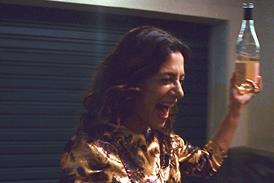Directed by Michel Gondry. US-France. 96 mins.
"Civilization and Its Discontents," Freud's well-known treatise about the eternal conflict between biology and sociology, could have served as the subtitle for the droll, often clever Human Nature, Charlie Kaufman's follow-up script to his celebrated Oscar-nominated film, Being John Malkovich. As staged by French music video and commercials director Michel Gondry, the new satire is consistently light and amusing, but not nearly as original, eccentric and poignant as Malkovich, which was directed by Spike Jonze, who here serves as producer, and marked one of the most audacious debuts in recent memory. A likeable cast, toplined by Tim Robbins, Patricia Arquette, and particularly Brit comic Rhys Ifans, should elevate the profile of this jovial satire, though structural deficiencies and thin, repetitive text will prevent this Fine Line autumn release from traveling very far beyond the specialised circuit.
The very first image, which shows a crow hunting two white mice in the forest, only to slam into a tree, establishes the quirky, offbeat tone of a satire that juxtaposes biological instincts, specifically the libido, with society's repressive socialisation, which tames and ruins humans' wilder instincts. Truffaut treated the same issue in a serious manner in Wild Child, in which he played the educator, and the idea has appeared in countless mythic tales, such as Tarzan and Robinson Crusoe.
In a healthy spoof of the court drama, the story begins at present, when the three protagonists narrate their intertwined biographies and how they led to the murder of Nathan (Robbins), a compulsive behavioural scientist, and imprisonment of Lila (Arquette), his lover-aide and then culprit. Key witness Puff (Ifans, of Notting Hill's fame), a wild child raised by a mentally unbalanced father, also testifies at Congressional hearings that lampoon 1950s sci-fi pictures.
Afflicted since puberty with a hormonal disorder that causes copious hair-growth all over her body, Lila begins her adult life with few expectations for happiness. Faced with dispiriting professional opportunities and certain she'll never find a suitable companion, she considers suicide, until an option that calls for her return to nature becomes immediately attractive.
Lila is not only at one with nature, but she goes on to become a best-selling author of pro-nature novels. Nonetheless, human nature being human nature, she can't ignore her sexual drive, which sends her back to the city in search of a mate. A chatty electrolysis expert, Louise (Rosie Perez), who works on her hairy body inch by inch, sets her up with Nathan (Robbins), a virginal behavioural scientist, who suffers from his own stigma: a tiny penis. Nonetheless, the two outcasts develop an idyllic trustworthy relationship that embraces their work and leisure.
Their lives change, when they stumble upon a feral man (Ifans) in the forest, raised by a father who literally went ape and ignorant of his mother's identity. The couple name him Puff and lock him in a plastic cell in Nathan's lab, where they observe his conduct day and night. The two disagree as to how much socialisation Puff should get, with Nathan standing for a severe and rigid process that will mold Puff in his own image, while Lila favouring a more natural and loose approach.
The central triangle soon becomes a complex quartet, when Nathan is seduced by his sexy French assistant, Gabrielle (Miranda Otto). It's in this section that the movie is at its funniest, showing the impossibility to curb Puff's unrestrained and insatiable sexual hunger. Puff not only imitates the humans, but doesn't miss a single opportunity to grab an attractive waitress in a restaurant, masturbate in front of sexy magazines and videos, and so on.
A quick study, Puff makes a rapid progress with his lessons - before long he speaks the Queen's English with a subtle Anglo tilt. Believing his species is ready to be shown in public, Nathan goes on a lecture tour with Puff, whose days are filled with tango demonstrations and eloquent speeches, and his nights with prostitutes and booze.
The last reel depicts the revenge Lila takes on Nathan upon learning of his betrayal. Kidnapping Puff and spiriting him back to nature, Lila vows to de-program Puff and re-educate him in the ways of the wild. However, with his ardor for Lila rekindled, Nathan can't forget the fugitive pair and, imitating the crow's hunt in the forest, he soon finds his death.
As in Malkovich, Kaufman shows an alert mind brimming with ideas. However, despite a promising postulate, Human Nature suffers from several problems. First, the material is slender, basically one idea that get numerous variations. Second, since all the important events are told in the first act, the tale has nowhere to go. Third, and most important, the structure is deficient, preventing a more direct audience involvement. The mini-histories of the three characters are intercut, and the incessant move from past to present and back to past creates too many layers-within layers. The whole movie assumes the shape of a string of jokey vignettes and sight gags, some more successful than others.
Nice production design, farcical tone, and charming cast, particularly Ifans, who looks a bit like David Warner in Morgan, compensate only up to a point. Nude scenes with Arquette and Ifans are handled with taste and discretion.
Prod co Studio Canal and Fine Line presentation of a Good Machine production, in association with Beverly Detroit and Partizan
US dist Fine Line
Int'l sales Studio Canal
Prods Anthony Bregman, Ted Hope, Spike Jonze, Charlie Kaufman
Scr Kaufman
CinematographerTim Maurice-Jones
Prod desK.K. Barrett
Ed Russell Icke
Music Graeme Revell
Main castTim Robbins, Patricia Arquette, Rhys Ifans, Miranda Otto, Rosie Perez



















No comments yet